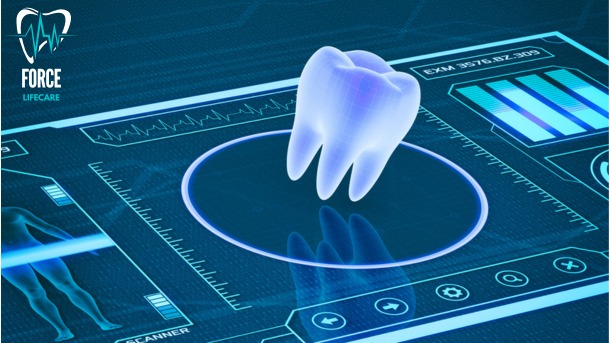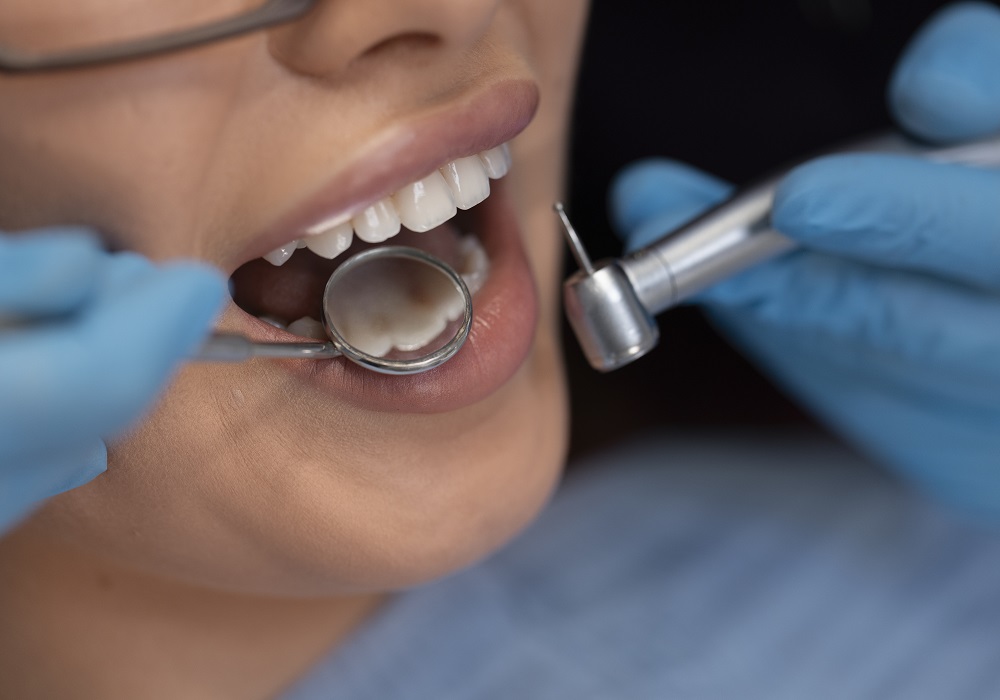Dental technology refers to the use of advanced tools, equipment, and techniques to diagnose, treat, and prevent dental conditions. Dental technology encompasses a wide range of technologies, including digital imaging, computer-aided design and manufacturing (CAD/CAM), laser dentistry, 3D printing, and robotics, among others.
Some examples of dental technologies are:
- Digital Imaging: Digital imaging technology, such as X-rays, CT scans, and 3D imaging, is used to diagnose dental problems and plan treatments. These images allow dental professionals to see the teeth and gums in detail, and can reveal hidden problems such as cavities, gum disease, and impacted teeth.
- Intraoral Cameras: These are small, handheld cameras that can capture high-quality images of the teeth and gums, allowing dentists to detect dental problems such as cavities, gum disease, and oral cancer.
- CAD/CAM: This technology uses computer-aided design and manufacturing to create dental restorations such as crowns, bridges, and dentures. The process involves using digital scans of the patient's teeth to create a custom restoration that fits perfectly.
- Laser Dentistry: This involves the use of lasers to treat dental conditions such as gum disease, tooth decay, and oral cancer. Laser dentistry is minimally invasive, meaning it causes less pain and discomfort than traditional dental procedures.
- 3D Printing: This technology is used to create dental models, surgical guides, and even dental implants. It allows dentists to create highly accurate and detailed models of the patient's teeth and gums.
- Dental Implants: Dental implants are an advanced dental technology that uses biocompatible materials such as titanium to replace missing teeth. They are placed directly into the jawbone and can last for many years with proper care.
Overall, dental technology has revolutionized the way dental professionals diagnose and treat dental conditions, making dental care more efficient, effective, and comfortable for patients.
What is the importance of dental technology?
What is the importance of dental technology?
Dental technology plays an essential role in the diagnosis, treatment, and prevention of dental problems. Here are some of the reasons why dental technology is important:
- Accurate Diagnosis: Dental technology enables dentists to accurately diagnose dental problems such as cavities, gum disease, and oral cancer. With the help of digital X-rays, intraoral cameras, and other imaging technologies, dentists can visualize the inside of the mouth and detect dental issues at an early stage.
- Improved Treatment: Advances in dental technology have led to new and improved treatments for dental problems. For example, dental implants have revolutionized the field of tooth replacement, while laser dentistry has made it possible to treat gum disease with less discomfort and faster healing times.
- Enhanced Patient Comfort: Dental technology has also made it possible to improve patient comfort during dental procedures. Digital anesthesia systems can deliver precise doses of anesthesia, reducing the risk of overmedication and minimizing discomfort during treatment.
- Better Patient Education: With the help of digital imaging and other technologies, dentists can show patients what is happening inside their mouth and help them understand the need for certain treatments. This can lead to better patient compliance and improved oral health outcomes.
- Increased Efficiency: Dental technology has also made dental procedures faster and more efficient. For example, digital scanning technology can create highly accurate impressions of the teeth without the need for messy traditional impressions, saving time and improving the accuracy of treatment planning.
Overall, dental technology has greatly improved the quality of dental care and has helped dentists provide better outcomes for their patients.
Dental procedures are a range of treatments that are performed by dental professionals to diagnose, treat, and prevent dental problems. Some common dental procedures include:
- Teeth Cleaning: This is a routine dental procedure that involves removing plaque, tartar, and stains from the teeth using specialized tools. It helps prevent tooth decay and gum disease.
- Fillings: Dental fillings are used to repair teeth that have been damaged by decay or trauma. The dentist will remove the damaged portion of the tooth and fill the cavity with a dental material such as composite resin or amalgam.
- Root Canal Therapy: This procedure is used to treat a tooth that has become infected or inflamed. The dentist will remove the infected pulp from the tooth, clean and disinfect the root canal, and fill it with a dental material.
- Crowns and Bridges: These are dental restorations that are used to repair or replace damaged or missing teeth. Crowns are used to cover a damaged tooth, while bridges are used to replace one or more missing teeth.
- Dental Implants: Dental implants are artificial tooth roots that are placed in the jawbone to support a replacement tooth or bridge. They are a permanent solution for missing teeth.
- Orthodontic Treatment: This involves using braces or other orthodontic appliances to correct misaligned teeth and jaws. Orthodontic treatment can improve the appearance and function of the teeth and jaw.
- Teeth Whitening: This is a cosmetic dental procedure that involves using a bleaching agent to lighten the colour of the teeth. It can improve the appearance of stained or discoloured teeth.
These are just a few examples of the many dental procedures that are available. The specific treatment that is recommended will depend on the patient's individual needs and the severity of the dental problem.
What is the most serious dental procedure?
The most serious dental procedure depends on the individual patient and their specific dental needs. Some dental procedures may be more complex or involve more risk than others, but all dental procedures should be taken seriously and performed by a qualified dental professional.
That being said, certain dental procedures are generally considered to be more complex or invasive than others. For example, oral surgery procedures such as dental implant placement, wisdom teeth removal, or orthognathic surgery (corrective jaw surgery) are typically more complex than routine dental procedures such as teeth cleaning or fillings.
Other procedures, such as root canal therapy or periodontal surgery for advanced gum disease, may also be considered serious or complex due to the level of skill and expertise required to perform them effectively.
In any case, it is important for patients to discuss the risks and benefits of any dental procedure with their dentist or oral surgeon and to follow all pre- and post-operative instructions carefully to ensure the best possible outcome.
FAQ
Tooth Extraction: This is the removal of a tooth from the socket in the bone. Tooth extraction is commonly performed when a tooth is severely damaged or decayed, or when there is not enough room for the tooth in the mouth.
Dental Implant Surgery: Dental implant surgery is the process of inserting a small, titanium post into the jawbone to replace a missing tooth. This surgery is performed under local anesthesia, and the implant must fuse with the jawbone over a period of several months before the replacement tooth can be attached.
Wisdom Teeth Removal: Wisdom teeth, also known as third molars, often need to be removed because they can cause problems such as impaction, infection, or crowding of other teeth.
Gum Surgery: Gum surgery, also known as periodontal surgery, is a range of procedures that are used to treat advanced gum disease. This may include procedures such as scaling and root planing, flap surgery, or gum grafts.
What are the three importance of teeth?
Teeth play a crucial role in our overall health and well-being. Here are three important functions of teeth:
Chewing and Digestion: Teeth are essential for chewing and breaking down food, making it easier to swallow and digest. Without teeth, we would have difficulty eating certain foods and might be at risk of malnutrition.
Speech: Teeth play a vital role in our ability to speak clearly. They help us form sounds and words by allowing us to make certain sounds with our lips and tongue.
Appearance and Self-Confidence: Our teeth play a significant role in our appearance and self-confidence. A healthy, straight, and white smile can make us feel more attractive and confident, which can have a positive impact on our social and professional lives.
Teeth are the hardest part of the human body: Teeth are made up of enamel, dentin, and cementum, which are some of the hardest substances found in the body. Enamel, the outer layer of the tooth, is even harder than bone and protects the inner layers of the tooth from damage.
Teeth are unique: Just like fingerprints, teeth are unique to each person. This is why dental records are often used to identify individuals in forensic investigations.
Teeth can reveal a lot about a person's health: Dentists can detect a wide range of health problems by examining a patient's teeth. For example, gum disease has been linked to heart disease, while tooth loss can be a sign of osteoporosis. Dentists can also detect signs of eating disorders, acid reflux, and even certain types of cancer during a routine dental exam.



 Dental Checkup Services
Dental Checkup Services
 Our range of products
Our range of products
 Oral Care Blogs
Oral Care Blogs

Recent Comments